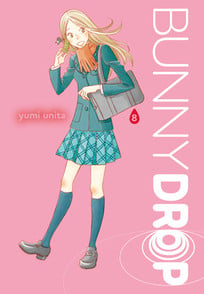Review
by Rebecca Silverman,Bunny Drop
GN 8
| Synopsis: |  |
||
Now that Masako has had her baby, Rin finds herself feeling like maybe the woman is her mother after all – in emotion, not just in biological fact. She's eager to be a big sister, something Daikichi and Kouki can't quite understand. With these new feelings about her family, Rin also finds herself wondering what exactly Daikichi is to her. If he's not really her father, then does that mean...? |
|||
| Review: | |||
And so the worst kept spoiler in recent manga memory comes, if not to fruition, then at least to blossom. The focus of this penultimate volume of Yumi Unita's Bunny Drop, an uneven tale of a man who takes in a little girl to raise, is in fact Rin's budding feelings for Daikichi, and though she doesn't really come out and say much, her thoughts and subtle actions and statements confirm that she is feeling less than daughterly towards him. While Unita does a decent job of showing us that part of Rin's emotions are due to the fact that she is now able to think of Masako as her mother, this is still a turn that is likely to make some readers unhappy. For the first significant amount of time over the course of the series, volume eight places us squarely in Rin's head. While we have heard her thoughts before, this volume is almost exclusively narrated by Rin, giving us a real chance to get to know her in a way that hasn't really happened before. What we see is a very confused girl. Her friends are all into romance, and she's not sure she understands that. She gets asked on a date and she's not really comfortable with that. She still clearly can't bring herself to fully trust Kouki after the events of middle school that we as readers were barely privy to, and the one really safe spot in her life is home, a place she equates with Daikichi. Looked at from this perspective, it becomes easy to see how Rin could fancy herself romantically attracted to her (for all intents and purposes) father – she knows there is little biological impediment to a relationship, he's always been there for her when no one else was, and he both makes her feel and is safe. For a girl feeling the pressure to embark on a romantic relationship, Daikichi fills the role that Kouki as childhood friend would have had Akari not sabotaged things. Simply put, this is a story we are familiar with in the trappings of shoujo romance – Unita has merely changed one of the characters. Whether or not this remains a fantasy of Rin's or if it crosses a distasteful line will doubtless be seen in the final volume; at this point one can only mention and interpret what is on the page. Unfortunately Unita's art suffers some this volume, as if she were drawing in a hurry. Rin is plagued by linebacker shoulders for much of the volume and legs and arms seem noodley in many scenes. The boy who asks Rin out towards the end of the book looks pretty much like a light-haired Kouki, which in Unita's defense may well be intentional, but it does throw one off in a couple of panels. For whatever reason there is also a much more 1970s feel to the art and clothing this time around, not in the sense that the art resembles that of Riyoko Ikeda, but rather that hair and clothes seem to be inspired by the fashions of the mid-seventies. It works quite well, particularly since very few scenes contain anything all that contemporary in terms of technology or construction; it is simply worth making mention of. What comes through most clearly in this book is Rin's overall confusion. This is makes a lot of sense and is pretty standard for her age, a time when you're technically still a child but adults begin to have grown-up expectations of you. Rin clearly has felt that she needs to grow up a bit faster than she might have otherwise in order to pay Daikichi back for having raised her – she does all of the cooking and much of the cleaning and shopping for the household – and these expectations that she has imposed on herself may be taking their emotional toll. Many of us can recall the conflicting emotions of being sixteen, and Yumi Unita shows them well without reducing the story to a Taylor Swift song. It may not be as compelling or interesting a read as it began as, but Unita can still tell a good story. As Bunny Drop ambles towards its conclusion, readers who were on the fence about the direction the story was headed in are not likely to be pleased, unless a May/December romance was what they were hoping for. Whether or not Daikichi will a) notice or b) be on board with Rin's feelings, or whether she eventually realizes what might be motivating those emotions, remains to be seen. On the whole, however, this story offers justification for Unita's plot choice while still managing to feel somehow disappointing. At this point it is easy to fall into the sunk cost fallacy and just keep reading because the series is almost over, but for many readers, it is likely that this volume will be too much. |
| Grade: | |||
|
Overall : B
Story : B+
Art : B-
+ Unita offers justification for Rin's emotions if you look between the lines, she draws a pretty good newborn. Good depiction of the emotional confusion of sixteen year olds without getting sappy. |
|||
| discuss this in the forum (27 posts) | | |||
| Production Info: | ||
|
Full encyclopedia details about Release information about |
||